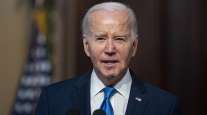California High Court Issues Mixed Ruling on Employee Meal Breaks Regulation
This story appears in the April 23 print edition of Transport Topics.
A ruling by the California Supreme Court has given employers little clarity about a controversial law governing employee rest breaks, the state’s trucking association said.
The court ruled on April 12 that employers must allow workers the opportunity to take meal breaks during the workday but do not have to ensure the workers take the breaks.
The ruling did not define what it means to provide a meal break and did not allow much flexibility in granting the breaks, said Michael Shaw, spokesman for the California Trucking Association.
“We look at the case as a bit of a mixed bag for trucking,” Shaw told Transport Topics, adding that ensuring truckers take meal breaks is nearly impossible.
The court ruled in a case in which Brinker International Inc., which owns restaurant chains such as Chili’s Grill & Bar and Romano’s Macaroni Grill, challenged California’s law establishing meal breaks for employees. CTA was not directly involved in the case.
California law requires that employees get a 30-minute rest break during a shift of up to five hours or two such breaks during a shift of up to 10 hours.
“An employer must relieve the employee of all duty for the designated period but need not ensure that the employee does no work,” Associate Justice Kathryn Werdegar wrote in the unanimous ruling.
Challenging the law, Brinker had asked the employees to be given flexibility on whether or not to take the break.
CTA is glad that the court chose not to require that employers ensure the breaks, “which for the trucking industry is virtually impossible to do,” Shaw said.
“The workforce is going to be out and about, and not in a location where you are likely to have control and ability to impose such requirements,” he said.
But CTA wished the court would have provided more clarity on employers’ responsibility, Shaw said, and the court also should have added more flexibility in scheduling breaks, which currently must fit within the specific five-hour windows.
Two federal district courts have ruled that the meal break provision is preempted by the Federal Aviation Administration Authorization Act of 1994, but their rulings have not been enforced, pending an expected appeal, Shaw said.
“If those cases are upheld, the issue of Brinker becomes moot,” he said. A circuit court ruling on appeal would overturn the law.
CTA is not directly involved in those cases, either, but when they are appealed to the circuit court level, Shaw said, he expects the association to file a “friend of the court” brief supporting the effort.
Brinker said it was pleased with the state court’s ruling.
“Today, the California Supreme Court defined key aspects of California’s meal and rest period laws — especially that employers need not force their employees to take meal periods they would prefer to skip,” Rex Heinke, partner at Akin, Gump, Strauss, Hauer & Feld, said in a statement.
Heinke was Brinker’s lead attorney in the case.



